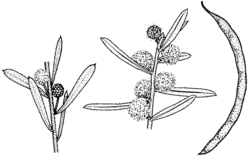Common name: rough wattle
Acacia aspera Lindl. APNI* Synonyms: Acacia erythrocephala A.Cunn. ex Benth. APNI*
Acacia strigosa Lindl. APNI*

Description: Erect or spreading shrub 1–2 m high; branchlets ± terete with ridges, resinous, hairy with some hairs glandular.
Phyllodes ± oblanceolate to narrowly elliptic-oblong or ± linear, ± straight, 1–4 cm long, 2–4 mm wide, sparsely hairy (some hairs gland-tipped), rough, midvein prominent, apex pungent-pointed; 1 inconspicuous gland near base; pulvinus to 1 mm long.
Inflorescences simple, 1 or 2 in axil of phyllodes; peduncles often 1–3 mm long or 8–15 mm long, hairy; heads globose, 30–50-flowered, 5–7 mm diam., bright yellow.
Pods curved or ± twisted or coiled 1–2 times, ± flat except over seeds, ± straight-sided to barely or irregularly more deeply constricted between seeds, 2–7 cm long, 3–5 mm wide, firmly papery to thinly leathery, densely hairy with some hairs gland-tipped; seeds longitudinal; funicle expanded towards seed.
Flowering: August–October.
Distribution and occurrence: Grows in sclerophyll forest at higher altitudes; chiefly south from near Yass and west to Parkes, and in mallee in the West Wyalong district; dubiously recorded for Sutton Forest (CT).
NSW subdivisions: ?CT, ST, CWS, SWS
Other Australian states: Vic.
Name is from the Latin asper, meaning rough, uneven, harsh, rugged; referring to the roughness of the branches and phyllodes caused by the prescence of short, erect, stiff hairs (N. Hall & L.A.S. Johnson, The Names of Acacias of New South Wales, 1993). Specimens in New South Wales are referable to subsp. aspera. Allan Cunningham referred the narrow phyllode forms, occurring in the Harvey Ranges near Peak Hill, to A. erythrocephala.
Text by P.G. Kodela (last updated June 2012)
Taxon concept: P.G. Kodela & G.J. Harden, Flora of NSW Vol. 2 (2002)
APNI* Provides a link to the Australian Plant Name Index (hosted by the Australian National Botanic Gardens) for comprehensive bibliographic data
***The AVH map option provides a detailed interactive Australia wide distribution map drawn from collections held by all major Australian herbaria participating in the Australian Virtual Herbarium project.
|


